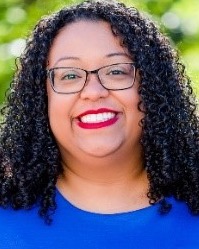 Elizabeth Jones Valderrama
Elizabeth Jones Valderrama
Executive Director
Offender Aid and Restoration (OAR)
In her role as ED, Elizabeth has championed innovative programs, energized staff and volunteers, expanded partnerships that benefit the community, and moved beyond diversity and inclusion to transform OAR into an organization committed to anti-racism and racial justice. (Black, Indigenous and People of Color (BIPOC) now comprise 50% of board members and 80% of staff.) She is an ethical and inspiring leader who has earned the full trust and confidence of funders, donors and partners. For the last five years, she has also worked to shape statewide reentry programs through the Pre and Post Incarceration Services Coalition (PAPIS: Virginia Reentry Coalition).
Tell us about your leadership style and how this contributes to your organization’s success.
At OAR, we are all about collective leadership. Our team is part of a collaborative that is journeying with OAR program participants and working together for racial justice and liberation. We are stronger and more effective when everyone engages, when all ideas can be put on the table, and we each know that our insights and experiences are valued. Even during the recent unprecedented times with COVID-19, because of our team’s commitment and creativity—both of which thrive in a collective setting—we quickly identified new ways to do our work virtually and continue to put our participants first.
Collectiveness also shows up in our care for each other. We believe that if we don’t have a healthy team, we can’t have a truly healthy organization. We require each team member to complete a self-care activity of their choosing weekly, and we contribute $40 a month towards their self-care activities. We also have Charlie, OAR’s Ambassador of Happiness, a therapy dog, at the office to greet the team members and all who come into the space, bringing joy and decreasing stress for all. We ask team members to “come as you are,” and we work hard to build an environment where all can be authentic and honored.
What advice would you offer for other nonprofit leaders?
OAR uses people-first and strength-based language and approaches. We see participants as experts on themselves and leaders for their own life and plans. All systems have failed them in every possible way, and we can’t allow OAR to fail them too. We continuously seek feedback and guidance from participants and found it essential to build a team that includes individuals who share life experiences with participants. In some cases, that shared experience is living with the reality of racism and, in others, actually knowing firsthand what it means to come home from incarceration and be impacted by the criminal legal system.
In the last five years, OAR had the courage to expand our mission to do both social services work (downstream), where we work with those experiencing the trauma of incarceration, and social justice work (upstream), where we challenge the systemic racism responsible for mass incarceration and other injustices. The ultimate goal is to end the social injustices and to put ourselves out of business. OAR will mark its 50th anniversary in 2024, and we don’t want to be here in another 50 years. We implore all nonprofits and everyone to join us on this journey and to remember that charity is not the appropriate response to injustice.
What does this award mean for you and your organization?
It would be a great honor to receive this award. It would affirm that the participants’ matter, that the community will not tolerate injustices, and it would lift up those who have dedicated our lives to this work.